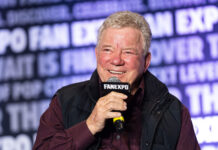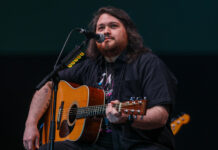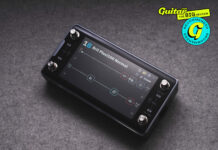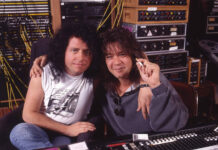
“We’ll do the opposite of what we should do”: The Coral’s James Skelly on why they made a double-album in the age of streaming
“We’re pretty… strange,” begins The Coral’s chief songwriter and rhythm guitarist James Skelly, pausing for a moment before settling upon the perfect descriptor for the Liverpool band. Their new double album, Coral Island, is a concept record beamed in from a forgotten fairground oasis where neon-lit waltzers hurtle past, soundtracked by the Brylcreemed jukebox idols of yesteryear. It is, he says, the band’s “White Album”, a 24-song opus crafted with beaten-up 60s guitars, in thrall to the echoey production style of Joe Meek.
READ MORE: The Genius Of… Bandwagonesque by Teenage Fanclub
“We’ve never fitted in,” Skelly continues, explaining the inherent strangeness one of the most idiosyncratic guitar bands of our times have embraced while landing No 1 albums, Mercury Prize nominations and millions of streams since forming in 1996 in the basement of Merseyside pub Flat Foot Sam’s. “Even when we tried to fit in, we were still weird. We always relate it to The Magic Band. If we’d been around in the 60s, we’d have been The Magic Band. We’re quite eccentric…”
Underlining his point, Skelly explains the rationale behind choosing to release a sprawling double-concept album at a time when streaming reigns supreme and attention spans are widely accepted to be on the wane. “What’s the most Coral thing to do?” he says, laughing at the defiantly anti-commercial impulse. “Make a double album in the time of streaming, when no-one wants a double album. We’ll do the opposite of what we should do…”
Noel limits
It was, it turns out, Noel Gallagher, the man that inspired Skelly as a 16-year-old to first pick up a guitar, who convinced him to follow his instinct.
“We were going to do it as two albums, three months apart, and then I went to see Noel’s studio and I was telling him about it. He said, ‘Why don’t you just put it out as one album? You’re over-thinking it. Fuck streaming’. I was thinking, ‘That’s alright for you to say, you’re minted’. But he had a point. As I was telling him what it was, it sounded really complicated, and I thought ‘Yeah, he’s right, it’s a double album’.”
The first four of The Coral’s albums arrived in a vertiginous four-year period, with 2002 debut The Coral certified Platinum and follow-up Magic And Medicine going Gold and landing a UK No. 1 a year later, but this is something different entirely.
Inspired in part by Bruce Springsteen’s The River, there are two distinct halves to Coral Island, the band’s 10th studio album. “Welcome To Coral Island was meant to be the soundtracks on the rides, dodgems and bars and arcades,” Skelly explains. “The Ghost Of Coral Island is when it closes down in the winter and the interesting characters are left behind. It’s got every side of The Coral in it. You segue between the tracks and bits of poetry, straight-up songs, weird rock’n’roll songs… everything’s on there.”
It’s a singularly unorthodox piece of work. The warm nostalgia of the pier is reflected in the rattle of the ghost train, with spoken-word interjections from the shadowy characters inhabiting the boardwalk and the album’s mysterious narrator, the Great Muriarty – alongside some typically classic songwriting from Skelly.
Making the record took him back to his childhood, growing up in the Wirral peninsular. His parents ran pubs, and he served in his dad’s burger van at fairgrounds, memories he describes as “magical”. His first guitar experiences were playing a modest Spanish acoustic owned by The Coral’s bassist Paul Duffy, before his first electrics arrived, a black Rickenbacker 360, then a sunburst Epiphone Casino, beginning a lifelong love affair with hollowbody guitars. His current number one is an early-80s Gibson ES-335 he’ll “never sell” that’s all over the new album.
Today, Skelly sees himself as a handy rhythm player, leaving lead duties to Paul Molloy, who’s been in the band since 2015 after the departures of Lee Southall and Bill Ryder-Jones.
“Growing up, I liked Bo Diddley, I liked The La’s, Pete Townshend, the way Bob Dylan plays acoustic and Neil Young, that’s what I gravitated to, and some of the guitar in Can – Mother Sky and stuff – but it’s always been rhythm, John Lee Hooker would be another of my favourites.”
Comings and goings
While the 335 is a fixture, Skelly’s prolific buying and selling, sometimes out of necessity, has seen the guitars characterising each of the band’s albums changing as often as the stylistic ground they’ve covered. The Coral’s uninhibited, lysergic sound has taken in Merseybeat, psychedelia, dub, hazy Americana, wonky doo-wop and acid-laced sea shanties as they’ve steadfastly followed their own path.
“I’ve had different phases,” he says. “On the early albums, we had Guilds, and I like buying Japanese Teiscos. Some of them are crap, but you can dig in and make weird 60s sounds. In the band’s middle phase, I got into Rickenbackers and now it’s 335s.
“On this record, Malloy uses a 60s Jag that’s like Trigger’s broom, I keep telling him to buy a new one, but he won’t let it go. Mostly on Coral Island, it was those thin-sounding Teiscos, though. They’re completely broken, one of them only had five strings, but they’re just strange-sounding.
“Everything went through this little 1948 tweed Fender Champ. We also used the 1992 Martin D-28 that we’ve used on every album. It’s the best acoustic I’ve ever owned, and I’ve bought and sold a lot of acoustics, including a 60s Martin I left on a train once…”
We feel the pain in Skelly’s weighty intake of breath as he recalls one that got away, and there have been others, too. One guitar that didn’t make it to Coral Island was a 1966 Autumn Glo Rickenbacker 360. It appears on the cover of his 2013 solo album Love Undercover.
“I had to sell it when we kind of lost all our money,” he says ruefully. Once the Ricky was listed on eBay, its former owner Wally Welch, one-time member of Californian band The Shake, recognised it as a guitar he’d bought in 1969 for $300. It had been stolen from his storage unit in June 1996, and found its way to an unknowing Skelly, who bought it from a seller in France. Some 17 years later, Welch paid $5,200 to bring it home to Orange County. “I wish I still had it though,” Skelly says with a sigh.
Sounds of summer
That Rickenbacker might not be present, but the sounds of the 60s are, as you’d expect, all over Coral Island, as is the band’s enduring love of legendary producer Joe Meek, most prominently on lead single Faceless Angel. The warm overdriven vocal and glorious slapback on Skelly’s shuffling guitar part recall Meek’s work on John Leyton’s Johnny Remember Me and the rock-solid rhythm playing of Duane Eddy and Chuck Berry. Late in the song, Skelly hits a chord on his 335, running through an AnalogMan King Of Tone and Strymon El Capistan tape echo, and the skittering repeats sound heavenly.
“We were trying to get that Chuck Berry sound on Downbound Train, Joe Meek doing that,” he says. “I was just hitting the chord on beat one, but it sounds like I’m playing it like Bo Diddley, and the drums are all moving around it.
“We wanted that reverby 13th Floor Elevators and Electric Prunes sound on the album, the next stage on from the 50s, quite psychedelic. A lot of it is inspired by Joe Meek’s production, thin sounds with a lot of echo and reverb on them.”
Making the record was a free-spirited, creative outpouring for the band, songs barely rehearsed before being laid down, and spontaneity allowed to colour the sessions at Liverpool’s Parr Street Studios. Recreating it live is going to be one hell of a ride. Skelly is planning to take his ’92 Martin and a red 1980s Telecaster given to him by Alan Wills, the founder of Deltasonic Records and the man who discovered The Coral. Also seeing action will be a blue Tokai S-type, his old Rickenbacker and the 335. Skelly’s also got his eye on a Gibson Hummingbird and has been thinking about his old Guild Starfires again. “I sound better on them,” he says. “I’m not clinical enough to play a Strat, you can hear all my fuck ups! It’s too clear for me…”
Time served
By the time the band can get out to tour Coral Island, they’ll be closing in on 20 years since their Mercury-nominated debut, a record that swam against the prevailing scruffy garage-rock tide led by The Strokes, The White Stripes and The Libertines, landing at No 5 in the UK chart. Skelly recently revisited the album and remembers, “I thought, ‘who are those crazy fuckers?! Mad bastards, what were they doing?!’. It’s a pretty out-there album, isn’t it? I’m proud of what we did, though, and in a way it’s probably still our best album, although I’m hoping people will say that about this one.”
Amid the wanton craziness and spiralling wig-outs on that first record was a piece of timeless songwriting that, alongside later entries Pass It On and In The Morning, elevated Skelly into the same rarefied bracket as Mersey idols Lee Mavers and Mick Head. Dreaming Of You has now been streamed more than 100 million times, Skelly half joking when he complains “I haven’t seen much from that”.
“Shack were in the studio with my dad’s mate Andy,” he recalls of the day he penned his most famous song. “I went to see him and I met Mick and John Head, we were speaking about Arthur Lee and Mick said he loved our demos. I hung out with Shack and it was like, ‘wow!’. I went back to my nan’s, where I was living, got off the train and I was skipping a beat, I was just buzzing. I got back to my little room and picked up my guitar and five minutes later I had that song. It was just a crap acoustic, a couple of hundred quid or whatever, not a great one, I didn’t have much money.”
“If I knew that, I’d do another one,” he answers with roguish charm when we ask what made the song so universal. “Maybe it’s the ‘I still need you, but I don’t want you’, everyone knows what that is, not wanting to want someone. It’s the energy of the band as well, though, that infectious youthful energy… I don’t think it’s the best or most profound song I’ve ever written, but the energy of that moment was captured in the recording. It just became a monster.”
The record industry has changed beyond all recognition since The Coral’s heady early days, but they’ve always maintained their integrity and embraced that fundamental strangeness. In today’s largely unrecognisable musical landscape, what would represent success for Coral Island?
“If we could get a Top 10, that would be massive for us, I don’t think we’ve had one for 10 years or something,” Skelly replies. “If we could go Top 10 and build on that, it would be great, but I’m grateful just to release a 10th album to be honest.
1 of 7
“I produce the band Blossoms now, and I say to them, the industry we started in is closer to the one The Beatles and Stones were in than the industry they’re in now. It was closer then to the 60s than now is to the early noughties. It’s all changed, and it’s almost like the first half of this century will be trying to find its way like the last one was. By the time of The Beatles, it had found its way, and it’s going to take that long again. I’ll be out of the game by that time…”
Coral Island is out 30 April on Run On Records / Modern Sky.
The post “We’ll do the opposite of what we should do”: The Coral’s James Skelly on why they made a double-album in the age of streaming appeared first on Guitar.com | All Things Guitar.
Source: www.guitar-bass.net











